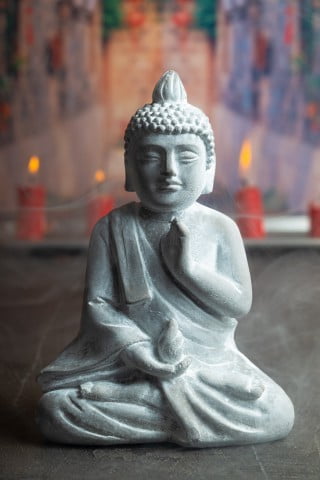Feng Shui, an ancient Chinese practice, emphasizes the importance of creating harmonious and balanced environments to promote health, happiness, and prosperity. In bedroom design, colors play a significant role in enhancing or disrupting the flow of positive energy. Understanding which colors to avoid is crucial to ensure that your bedroom remains a sanctuary of relaxation and rejuvenation.
When it comes to implementing Feng Shui principles in your bedroom, selecting the right colors is essential. Colors have the power to influence our emotions, thoughts, and overall well-being. By choosing the wrong hues, you may inadvertently disrupt the flow of Chi (energy) in your space, leading to negative consequences such as restlessness, anxiety, or even health issues.
Certain colors can have adverse effects on the energy flow within a bedroom according to Feng Shui teachings. Red is one such color often advised against for bedrooms due to its association with passion and intensity, which may hinder relaxation and sleep.
Similarly, black and other dark shades are believed to absorb light and create a heavy atmosphere, potentially affecting mood and energy levels negatively. It is vital to understand how different colors can impact the overall harmony of your sleeping space in order to create a peaceful environment conducive to rest and rejuvenation.
Importance of Color in Feng Shui
The use of color in Feng Shui is essential as it plays a significant role in creating harmony, balance, and positive energy flow within a space. In the practice of Feng Shui, each color is associated with specific elements and energies that can impact different aspects of life, including health, relationships, and overall well-being. Understanding the importance of color and how it interacts with the elements can help individuals make informed decisions when choosing colors for their bedroom.
In Feng Shui, different colors are believed to activate or suppress certain energies in a space. For example, soothing and calming colors like soft blues and greens are often recommended for bedrooms to promote relaxation and sleep.
These colors are associated with the water and wood elements, which symbolize renewal, tranquility, and growth. On the other hand, using bold or aggressive colors like bright reds or fiery oranges can disrupt the peaceful energy flow in a bedroom and should be avoided according to Feng Shui principles.
It is crucial to note that personal preferences play a significant role in selecting bedroom colors based on Feng Shui principles. While there are general guidelines on colors to use for a harmonious bedroom design, individuals should also consider how certain colors make them feel personally. Ultimately, creating a balanced and inviting space that resonates with the individual’s energy is key to promoting overall well-being and restful sleep in a Feng Shui-inspired bedroom.
| Colors | Impact |
|---|---|
| Red | Disrupts peaceful energy flow |
| Black/Dark Colors | Can create heaviness or negativity |
Best Colors for a Feng Shui Bedroom
When it comes to creating a harmonious and balanced environment in your bedroom using Feng Shui principles, color plays a crucial role. Choosing the right colors can enhance the energy flow, promote relaxation, and improve sleep quality. While certain colors are recommended for a Feng Shui bedroom, there are also colors that should be avoided to maintain positive energy in the space.
To create a peaceful and calming atmosphere in your bedroom, consider using soft and soothing colors that promote rest and relaxation. According to Feng Shui principles, colors like light blue, pale green, soft pink, and lavender are ideal for bedrooms as they represent serenity, healing, and tranquility. These colors can help create a sense of balance and harmony in the space, allowing for better energy flow and overall well-being.
In contrast to the calming shades mentioned above, there are also colors not to use for a Feng Shui bedroom as they can disrupt the flow of positive energy. Bright and stimulating colors like red, vibrant orange, and intense yellow are considered too strong for a bedroom environment according to Feng Shui principles.
These bold hues can be overly energizing and might hinder relaxation and restful sleep. It’s best to avoid these vibrant colors in large quantities or opt for more muted tones if you still want to incorporate them into your bedroom decor.
- Shades of red: While red is associated with passion and intensity, it is not recommended in large amounts for a bedroom as it can be too stimulating.
- Vibrant orange: Orange is believed to be an energetic color that might disrupt sleep patterns if used excessively in a bedroom setting.
- Intense yellow: Bright yellows can be overwhelming in a bedroom space and may lead to restlessness rather than relaxation.
Negative Effects of Using Wrong Colors in a Bedroom
When it comes to designing a bedroom based on Feng Shui principles, the colors used play a significant role in creating a harmonious and balanced environment. While certain colors are believed to promote positive energy and enhance well-being, there are also colors that are not recommended for a Feng Shui bedroom. These colors can have negative effects on the overall energy flow in the space, leading to disrupted sleep, increased stress levels, and general feelings of imbalance.
To ensure that your bedroom promotes restful sleep and positive energy, it is important to avoid using certain colors that may disrupt the harmonious flow of Qi. Here are some colors not to use for a Feng Shui bedroom:
- Red: Known as a color of passion and fire, red is considered too stimulating for a bedroom environment. It can increase feelings of restlessness and agitation, making it difficult to relax and unwind.
- Black: Often associated with negativity and darkness, black can evoke feelings of sadness and heaviness. Using black or other dark colors in excess can create an oppressive atmosphere that hinders relaxation.
- Grey: While grey may seem like a neutral choice, it can actually dampen the energy flow in a room. In Feng Shui, grey is thought to symbolize indecisiveness and lack of clarity.
By avoiding these colors not suitable for a Feng Shui bedroom and opting for more soothing tones instead, you can create a space that promotes positivity, relaxation, and optimal energy flow. Remember that the goal of Feng Shui design is to achieve balance and harmony in all aspects of your living environment, including the colors you choose for your personal sanctuary.
Colors to Avoid in a Feng Shui Bedroom
Feng Shui emphasizes the importance of color in creating a harmonious and balanced environment, especially in the bedroom. While certain colors are known to promote relaxation, tranquility, and positive energy flow, there are also colors that should be avoided when designing a Feng Shui bedroom. These colors can disrupt the balance and flow of energy in the space, leading to negative effects on your overall well-being.
One of the main colors to avoid in a Feng Shui bedroom is red. While red is often associated with love and passion, it is also a very intense color that can create too much excitement and energy in the bedroom. In Feng Shui principles, red is considered too stimulating for a restful sleep environment. It is believed that having too much red in a bedroom can lead to insomnia, restlessness, and even arguments between partners.
Another color to steer clear of in a Feng Shui bedroom is black or any other dark hue. Dark colors like black absorb light rather than reflect it, creating a heavy and oppressive atmosphere. This can result in feelings of sadness, depression, and stagnation within the space. If you still wish to incorporate dark colors into your bedroom design, consider balancing them out with lighter shades or introducing elements that bring more light into the room.
When choosing the right colors for your Feng Shui bedroom, it’s important to consider not just personal preferences but also how each color affects your energy levels and emotions. By avoiding colors that are too stimulating or oppressive, you can create a serene and peaceful retreat where you can truly relax and rejuvenate both body and mind.
| Color | Effects |
|---|---|
| Red | Too stimulating for restful sleep environment; may lead to insomnia. |
| Black/Dark Colors | Absorb light creating heaviness; can induce feelings of sadness or depression. |
Why Red Is Not Recommended in Feng Shui Bedrooms
The color red holds a significant meaning in Feng Shui philosophy, symbolizing energy, passion, and power. While red can be an auspicious color in many aspects of life, it is generally not recommended for use in bedroom design according to Feng Shui principles. This is because red is considered a very yang color, which means it is associated with high energy levels and can create a sense of restlessness or agitation in a space meant for relaxation and rejuvenation.
In a Feng Shui bedroom, the ultimate goal is to create a harmonious environment that promotes restful sleep and emotional balance. The use of red in this space can disrupt the peaceful atmosphere needed for quality rest, leading to insomnia or heightened emotional states. Additionally, red is also believed to stimulate appetite and increase adrenaline levels, which are not conducive to a calming bedtime routine.
For those looking to enhance the Feng Shui energy in their bedroom, it is recommended to avoid using shades of red such as bright crimson or fiery orange. Instead, opt for soothing colors like soft blues, gentle greens, or tranquil neutrals that promote feelings of serenity and relaxation. By choosing the right colors for your bedroom based on Feng Shui principles, you can create a space that supports both physical and emotional well-being.
The Impact of Black and Dark Colors in Bedroom Feng Shui
When it comes to creating a harmonious environment in your bedroom using Feng Shui principles, the selection of colors plays a crucial role. While some colors can enhance positive energy and promote balance, others can have a negative impact on the overall energy flow in the space. One such group of colors that should be avoided in a Feng Shui bedroom are black and other dark shades.
Black in Feng Shui
Black is often associated with power, mystery, and elegance, but in Feng Shui, it is considered to be too heavy and absorbing. The color black symbolizes water element in Feng Shui, which signifies deep emotions and introspection. However, when used excessively or inappropriately in a bedroom setting, it can create a sense of heaviness and drain the energy from the room.
The Impact of Dark Colors
In addition to black, other dark colors such as deep browns, dark purples, and navy blues should also be avoided in a Feng Shui bedroom. These colors are believed to absorb light and make the space feel smaller and more confined.
In terms of energy flow, dark colors can suppress the natural flow of Chi (energy) in the room, leading to feelings of stagnation and lethargy. It is essential to create a bedroom environment that encourages restful sleep and relaxation, which can be disrupted by the use of dark hues.
Light vs Dark Colors for Creating Balance in a Bedroom
When it comes to choosing the perfect color scheme for your Feng Shui bedroom, finding the right balance between light and dark colors is essential. Light colors like soft blues, calming greens, and gentle pinks can create a sense of peace and tranquility in the space. These colors are known to promote relaxation and restful sleep, making them ideal choices for a bedroom.
On the other hand, dark colors such as deep purples, rich browns, and intense blacks can bring a feeling of heaviness and stagnation to a room. In Feng Shui, these colors are often associated with negative energy and can disrupt the flow of chi in the space. It is important to use dark colors sparingly in a bedroom and balance them with lighter hues to create harmony.
The Power of Contrast
One way to incorporate both light and dark colors into your Feng Shui bedroom is by using contrast effectively. Pairing light walls with darker furniture or bedding can create visual interest while maintaining a sense of balance in the room. Consider adding accent pieces in darker shades to add depth to the space without overwhelming it with heavy energy.
Finding Your Ideal Balance
Ultimately, finding the perfect balance between light and dark colors in your Feng Shui bedroom comes down to personal preference and intuition. Experiment with different color combinations and pay attention to how each hue makes you feel in the space. Trust your instincts when choosing colors for your bedroom, as creating a harmonious environment that promotes positive energy is key to achieving optimal Feng Shui design.
How to Choose the Right Colors for Your Feng Shui Bedroom
Choosing the right colors for your Feng Shui bedroom is essential in creating a harmonious and balanced space that promotes restful sleep and positive energy flow. When it comes to selecting colors for your bedroom, it is crucial to consider the principles of Feng Shui and how different hues can impact the overall energy and atmosphere of the room.
In Feng Shui, certain colors are believed to enhance specific areas of life, such as love, health, wealth, and career. For example, soothing blues and greens are often recommended for bedrooms as they promote relaxation and tranquility. These colors are said to create a peaceful environment conducive to restful sleep and emotional well-being.
On the other hand, there are colors not to use for a Feng Shui bedroom due to their potentially negative effects on energy flow and overall harmony in the space. Bright, intense colors like reds and oranges are often discouraged in bedrooms as they can be too stimulating and disruptive to sleep.
Similarly, dark colors such as black or deep purples can create a heavy or oppressive atmosphere that may hinder relaxation and rejuvenation. By avoiding these challenging hues and opting for more calming shades, you can create a more balanced and supportive environment in your bedroom.
Conclusion
In conclusion, when it comes to creating a harmonious environment in your bedroom using Feng Shui principles, choosing the right colors is key. The colors you select can have a significant impact on the energy flow and overall feel of the space. By understanding the best colors to use and avoiding those that can disrupt the balance, you can create a peaceful and rejuvenating sanctuary for rest and relaxation.
It is crucial to remember that certain colors are not recommended for a Feng Shui bedroom, as they can bring about negative effects such as disturbances in sleep, heightened emotions, or lack of tranquility. Colors like red, black, and other dark shades should be avoided in this space to maintain a calming atmosphere conducive to rest and rejuvenation. By being mindful of the colors you choose, you can promote positive energy flow and enhance overall well-being in your bedroom.
In essence, creating a harmonious environment with color in Feng Shui involves selecting hues that promote serenity, balance, and positivity. Lighter shades like pastels, whites, blues, and greens are ideal choices for a Feng Shui bedroom, as they encourage relaxation and tranquility. By incorporating these colors thoughtfully into your decor scheme and avoiding the colors not recommended for a Feng Shui bedroom, you can cultivate a space that supports restful sleep, emotional well-being, and overall harmony in your home.
Frequently Asked Questions
What Colors Should You Avoid in Feng Shui Bedroom?
In Feng Shui, it is generally advised to avoid using bright, bold, or overwhelming colors in the bedroom. Overly stimulating colors like red, bright yellow, and orange can disrupt the peaceful and calming energy needed for restful sleep.
What Color Should Not Be Used in a Bedroom?
The color black is typically recommended to be avoided in bedroom decor according to Feng Shui principles. Black is considered a heavy and absorbing color that can create a sense of negativity or stagnation in the space, hindering relaxation and rejuvenation.
What Is Bad Feng Shui for Bedroom?
Bad Feng Shui in the bedroom can include clutter, mirrors reflecting the bed, electronics near the sleeping area, poor air quality or lighting, and sharp objects pointing towards the bed. These factors can contribute to disrupted sleep patterns and overall negative energy flow in the room.

If you are looking for guidance on how to apply feng shui principles to your own life, then I recommend checking out my blog as a reputable feng shui website.





